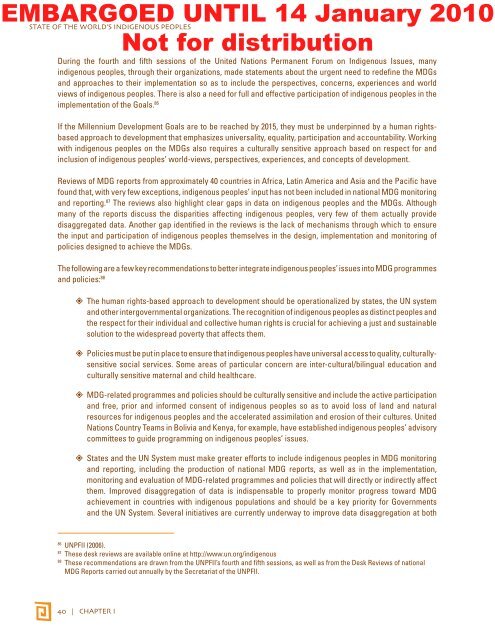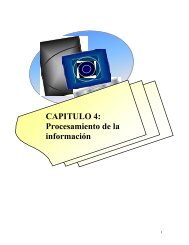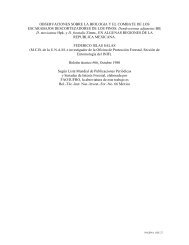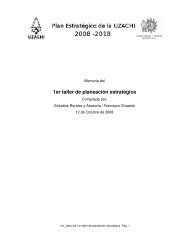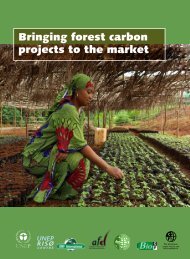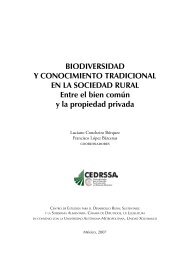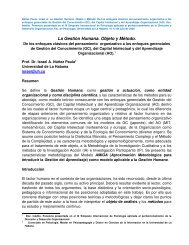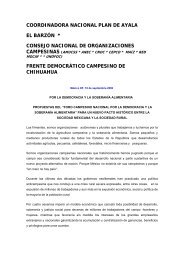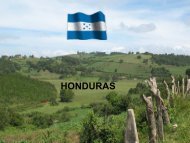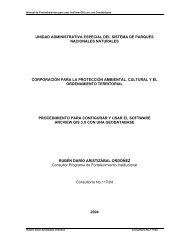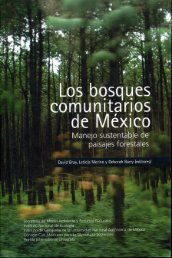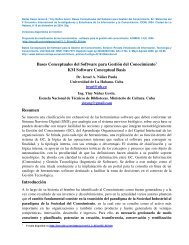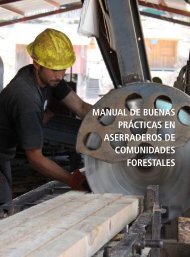STATE OF THE WORLD's INDIGENOUs PEOpLEs - CINU
STATE OF THE WORLD's INDIGENOUs PEOpLEs - CINU
STATE OF THE WORLD's INDIGENOUs PEOpLEs - CINU
- No tags were found...
Create successful ePaper yourself
Turn your PDF publications into a flip-book with our unique Google optimized e-Paper software.
EMBARGOED UNTIL 14 January 2010<strong>STATE</strong> <strong>OF</strong> <strong>THE</strong> WORLD’S INDIGENOUS PEOPLESNot for distributionDuring the fourth and fifth sessions of the United Nations Permanent Forum on Indigenous Issues, manyindigenous peoples, through their organizations, made statements about the urgent need to redefine the MDGsand approaches to their implementation so as to include the perspectives, concerns, experiences and worldviews of indigenous peoples. There is also a need for full and effective participation of indigenous peoples in theimplementation of the Goals. 86If the Millennium Development Goals are to be reached by 2015, they must be underpinned by a human rightsbasedapproach to development that emphasizes universality, equality, participation and accountability. Workingwith indigenous peoples on the MDGs also requires a culturally sensitive approach based on respect for andinclusion of indigenous peoples’ world-views, perspectives, experiences, and concepts of development.Reviews of MDG reports from approximately 40 countries in Africa, Latin America and Asia and the Pacific havefound that, with very few exceptions, indigenous peoples’ input has not been included in national MDG monitoringand reporting. 87 The reviews also highlight clear gaps in data on indigenous peoples and the MDGs. Althoughmany of the reports discuss the disparities affecting indigenous peoples, very few of them actually providedisaggregated data. Another gap identified in the reviews is the lack of mechanisms through which to ensurethe input and participation of indigenous peoples themselves in the design, implementation and monitoring ofpolicies designed to achieve the MDGs.The following are a few key recommendations to better integrate indigenous peoples’ issues into MDG programmesand policies: 88 The human rights-based approach to development should be operationalized by states, the UN systemand other intergovernmental organizations. The recognition of indigenous peoples as distinct peoples andthe respect for their individual and collective human rights is crucial for achieving a just and sustainablesolution to the widespread poverty that affects them. Policies must be put in place to ensure that indigenous peoples have universal access to quality, culturallysensitivesocial services. Some areas of particular concern are inter-cultural/bilingual education andculturally sensitive maternal and child healthcare. MDG-related programmes and policies should be culturally sensitive and include the active participationand free, prior and informed consent of indigenous peoples so as to avoid loss of land and naturalresources for indigenous peoples and the accelerated assimilation and erosion of their cultures. UnitedNations Country Teams in Bolivia and Kenya, for example, have established indigenous peoples’ advisorycommittees to guide programming on indigenous peoples’ issues. States and the UN System must make greater efforts to include indigenous peoples in MDG monitoringand reporting, including the production of national MDG reports, as well as in the implementation,monitoring and evaluation of MDG-related programmes and policies that will directly or indirectly affectthem. Improved disaggregation of data is indispensable to properly monitor progress toward MDGachievement in countries with indigenous populations and should be a key priority for Governmentsand the UN System. Several initiatives are currently underway to improve data disaggregation at both86UNPFII (2006).87These desk reviews are available online at http://www.un.org/indigenous88 These recommendations are drawn from the UNPFII’s fourth and fifth sessions, as well as from the Desk Reviews of nationalMDG Reports carried out annually by the Secretariat of the UNPFII.40 | CHAPTER I


